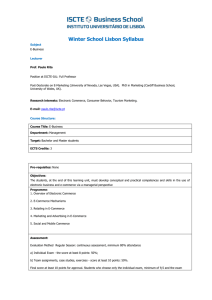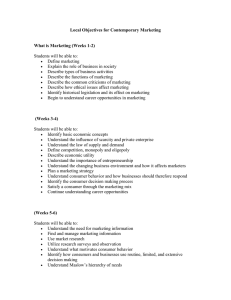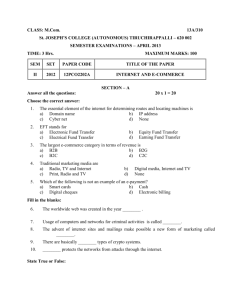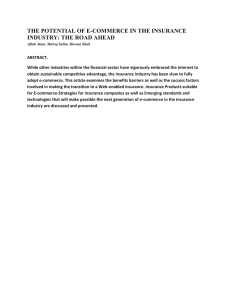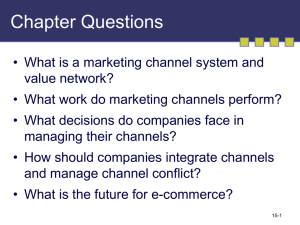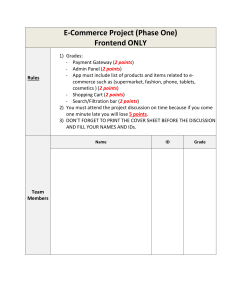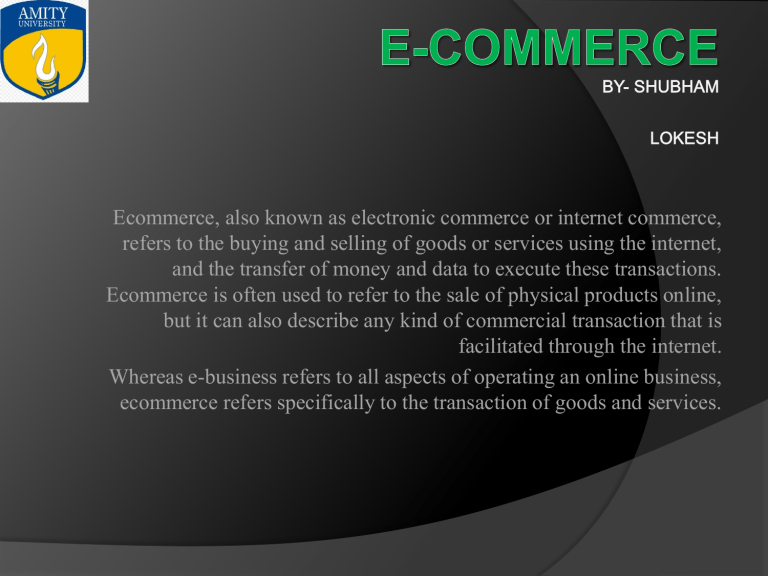
Ecommerce, also known as electronic commerce or internet commerce, refers to the buying and selling of goods or services using the internet, and the transfer of money and data to execute these transactions. Ecommerce is often used to refer to the sale of physical products online, but it can also describe any kind of commercial transaction that is facilitated through the internet. Whereas e-business refers to all aspects of operating an online business, ecommerce refers specifically to the transaction of goods and services. E-business E-business (electronic business) is the conduct of online business processes on the web, internet, extranet or a combination thereof. These customer-, internal- and managementfocused business processes include buying and selling goods and services, servicing customers, processing payments, managing production and supply chains, collaborating with business partners, sharing information, running automated employee services and recruiting employees. M - commerce Mobile commerce, also known as mcommerce, involves using wireless handheld devices like cellphones and tablets to conduct commercial transactions online, including the purchase and sale of products, online banking, and paying bills. The use of m-commerce activity is on the rise. According to market research company Statista, mobile commerce sales in the United States are an estimated $431 billion in 2022. Advantages of E-Commmerce 1. Faster buying process 2. Store and product listing creation 3. Cost reduction 4. Affordable advertising and marketing 5. Flexibility for customers o Disadvantages of E-Commerce 1.No possibility of tried and tested product 2.Some products are difficult to buy online 3.Lack of personal touch 4.Lack of privacy 5.Huge technological cost E-com Technologies Technologies every e-commerce site needs Artificial intelligence (AI)-AI is revealing valuable insights into customer preferences — which can guide marketing campaigns. It also can provide for the automation and transfer of data management operations to increase performance. In the retail and e-commerce world, AI is being relied upon for several unique aspects of business. Chatbots- Recognized for their customer satisfaction rates and widescale availability, chatbots have pivoted from limited use in call centers to wide-spread e-commerce website applications. Rather than asking questions and providing information to those over the phone, ecommerce websites that utilize chatbots can provide a variety of services and solutions. Voice assistants- Not everyone searches for products and information via mouse and keyboard in the digital age. To accommodate these potential customers, businesses will need to adopt voice commerce — using voice recognition technology and allowing customers to use voice commands to find and purchase products online. Limitation 1. Huge technological cost :- Since everything is online, it requires the use of creative resources and also a large amount of investment. The costs have become very high due to an excessive 4G and 5G data usage for online work. 2. Security :- This is one of the most common issues that many e-commerce businesses and customers face. There are many websites that are not capable of authenticating transactions nor have those features. 3. Huge advertising cost :- In order to promote your business, a lot of money has to be spent advertising initially. Advertising has the potential to increase your reach, and this way, you can reach maximum people. However, advertising in several mediums can be expensive. 4. High shipping cost :- Shipping can be a major challenge for most e-commerce businesses. When you are delivering B2C orders, shipping can pose a major challenge and disadvantage. 5. Cost of packaging :- Packaging, whether Primary, Secondary, or Tertiary, involves a lot of costs. The cost depends upon the nature of the product. It may cost a lot if the package is bulky and large. 6. Warehousing cost :- This is also a limitation of e-commerce. E-commerce sellers must have a physical location or warehouse where they can store their products. This would help them manage their operations from a designated location. This cost of warehousing has to be borne by the business itself. 7. Complicated e-Commerce policies :- Every e-commerce portal has its policies that the seller must comply with. Companies like Amazon, Flipkart, Paytm, Myntra, etc, have business policies. Sellers register on these platforms, and often these platforms do not give them full rights to operate in the marketplace. This limits their business, and if they violate these rules, their account may be permanently suspended.
